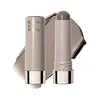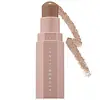What's inside
What's inside
 Key Ingredients
Key Ingredients

 Benefits
Benefits

 Concerns
Concerns

 Ingredients Side-by-side
Ingredients Side-by-side

Isodecyl Isononanoate
EmollientSilica
AbrasiveSynthetic Wax
AbrasiveOctyldodecyl Stearoyl Stearate
EmollientC12-15 Alkyl Benzoate
AntimicrobialEthylhexyl Isononanoate
EmollientMicrocrystalline Wax
Emulsion StabilisingPentaerythrityl Tetraisostearate
EmollientCI 77891
Cosmetic ColorantSynthetic Fluorphlogopite
Caprylic/Capric Triglyceride
MaskingSorbitan Sesquioleate
EmulsifyingPolybutene
Sorbitan Isostearate
EmulsifyingCuprous Oxide
Skin ConditioningChromium Hydroxide Green
Tocopheryl Acetate
AntioxidantGlyceryl Caprylate
EmollientStearalkonium Hectorite
Gel FormingFerric Chloride
AstringentCaprylyl Glycol
EmollientIsopropyl Titanium Triisostearate
EmollientPropylene Carbonate
SolventLimnanthes Alba Seed Oil
Skin ConditioningEthylhexylglycerin
Skin ConditioningAluminum Hydroxide
EmollientWater
Skin ConditioningArginine/Lysine Polypeptide
Skin ConditioningBHT
AntioxidantTocopherol
Antioxidant1,2-Hexanediol
Skin ConditioningSodium Hyaluronate
HumectantSorbic Acid
PreservativeIsodecyl Isononanoate, Silica, Synthetic Wax, Octyldodecyl Stearoyl Stearate, C12-15 Alkyl Benzoate, Ethylhexyl Isononanoate, Microcrystalline Wax, Pentaerythrityl Tetraisostearate, CI 77891, Synthetic Fluorphlogopite, Caprylic/Capric Triglyceride, Sorbitan Sesquioleate, Polybutene, Sorbitan Isostearate, Cuprous Oxide, Chromium Hydroxide Green, Tocopheryl Acetate, Glyceryl Caprylate, Stearalkonium Hectorite, Ferric Chloride, Caprylyl Glycol, Isopropyl Titanium Triisostearate, Propylene Carbonate, Limnanthes Alba Seed Oil, Ethylhexylglycerin, Aluminum Hydroxide, Water, Arginine/Lysine Polypeptide, BHT, Tocopherol, 1,2-Hexanediol, Sodium Hyaluronate, Sorbic Acid
Tricaprylin
MaskingC12-15 Alkyl Ethylhexanoate
EmollientPolyethylene
AbrasivePolymethyl Methacrylate
Octyldodecanol
EmollientSucrose Acetate Isobutyrate
Mica
Cosmetic ColorantCera Microcristallina
Emulsion StabilisingOctyldodecyl Neopentanoate
EmollientSilica
AbrasivePolymethylsilsesquioxane
Caprylyl Glycol
EmollientCetyl PEG/PPG-10/1 Dimethicone
EmulsifyingVp/Eicosene Copolymer
Vp/Hexadecene Copolymer
Cocos Nucifera Oil
MaskingPentaerythrityl Tetra-Di-T-Butyl Hydroxyhydrocinnamate
AntioxidantTocopheryl Acetate
AntioxidantAscorbyl Palmitate
AntioxidantSodium Hyaluronate
HumectantTocopherol
AntioxidantCalcium Sodium Borosilicate
Synthetic Fluorphlogopite
Calcium Aluminum Borosilicate
Polyethylene Terephthalate
Acrylates Copolymer
Tin Oxide
AbrasiveTitanium Dioxide
Cosmetic ColorantIron Oxides
CI 15985
Cosmetic ColorantCI 19140
Cosmetic ColorantBHT
AntioxidantCI 77891
Cosmetic ColorantTricaprylin, C12-15 Alkyl Ethylhexanoate, Polyethylene, Polymethyl Methacrylate, Octyldodecanol, Sucrose Acetate Isobutyrate, Mica, Cera Microcristallina, Octyldodecyl Neopentanoate, Silica, Polymethylsilsesquioxane, Caprylyl Glycol, Cetyl PEG/PPG-10/1 Dimethicone, Vp/Eicosene Copolymer, Vp/Hexadecene Copolymer, Cocos Nucifera Oil, Pentaerythrityl Tetra-Di-T-Butyl Hydroxyhydrocinnamate, Tocopheryl Acetate, Ascorbyl Palmitate, Sodium Hyaluronate, Tocopherol, Calcium Sodium Borosilicate, Synthetic Fluorphlogopite, Calcium Aluminum Borosilicate, Polyethylene Terephthalate, Acrylates Copolymer, Tin Oxide, Titanium Dioxide, Iron Oxides, CI 15985, CI 19140, BHT, CI 77891
 Reviews
Reviews

Ingredients Explained
These ingredients are found in both products.
Ingredients higher up in an ingredient list are typically present in a larger amount.
BHT is a synthetic antioxidant and preservative.
As an antioxidant, it helps your body fight off free-radicals. Free-radicals are molecules that may damage your skin cells.
As a preservative, it is used to stabilize products and prevent them from degrading. Specifically, BHT prevents degradation from oxidation.
The concerns related to BHT come from oral studies; this ingredient is currently allowed for use by both the FDA and EU.
However, it was recently restricted for use in the UK as of April 2024.
Learn more about BHTCaprylyl Glycol is a humectant and emollient, meaning it attracts and preserves moisture.
It is a common ingredient in many products, especially those designed to hydrate skin. The primary benefits are retaining moisture, skin softening, and promoting a healthy skin barrier.
Though Caprylyl Glycol is an alcohol derived from fatty acids, it is not the kind that can dry out skin.
This ingredient is also used as a preservative to extend the life of products. It has slight antimicrobial properties.
Learn more about Caprylyl GlycolCi 77891 is a white pigment from Titanium dioxide. It is naturally found in minerals such as rutile and ilmenite.
It's main function is to add a white color to cosmetics. It can also be mixed with other colors to create different shades.
Ci 77891 is commonly found in sunscreens due to its ability to block UV rays.
Learn more about CI 77891Silica, also known as silicon dioxide, is a naturally occurring mineral. It is used as a fine, spherical, and porous powder in cosmetics.
Though it has exfoliant properties, the function of silica varies depending on the product.
The unique structure of silica enhances the spreadability and adds smoothness, making it a great texture enhancer.
It is also used as an active carrier, emulsifier, and mattifier due to its ability to absorb excess oil.
In some products, tiny microneedles called spicules are made from silica or hydrolyzed sponge. When you rub them in, they lightly polish away dead skin layers and enhance the penetration of active ingredients.
Learn more about SilicaSodium Hyaluronate is hyaluronic acid's salt form. It is commonly derived from the sodium salt of hyaluronic acid.
Like hyaluronic acid, it is great at holding water and acts as a humectant. This makes it a great skin hydrating ingredient.
Sodium Hyaluronate is naturally occurring in our bodies and is mostly found in eye fluid and joints.
These are some other common types of Hyaluronic Acid:
Learn more about Sodium HyaluronateSynthetic Fluorphlogopite is the synthethic version of mica. It consists of fluorine, aluminum and silicate.
Synthetic Fluorphlogopite is used to add volume to products.
It is considered non-irritating on the skin.
Learn more about Synthetic FluorphlogopiteTocopherol (also known as Vitamin E) is a common antioxidant used to help protect the skin from free-radicals and strengthen the skin barrier. It's also fat soluble - this means our skin is great at absorbing it.
Vitamin E also helps keep your natural skin lipids healthy. Your lipid skin barrier naturally consists of lipids, ceramides, and fatty acids. Vitamin E offers extra protection for your skin’s lipid barrier, keeping your skin healthy and nourished.
Another benefit is a bit of UV protection. Vitamin E helps reduce the damage caused by UVB rays. (It should not replace your sunscreen). Combining it with Vitamin C can decrease sunburned cells and hyperpigmentation after UV exposure.
You might have noticed Vitamin E + C often paired together. This is because it is great at stabilizing Vitamin C. Using the two together helps increase the effectiveness of both ingredients.
There are often claims that Vitamin E can reduce/prevent scarring, but these claims haven't been confirmed by scientific research.
Learn more about TocopherolTocopheryl Acetate is AKA Vitamin E. It is an antioxidant and protects your skin from free radicals. Free radicals damage the skin by breaking down collagen.
One study found using Tocopheryl Acetate with Vitamin C decreased the number of sunburned cells.
Tocopheryl Acetate is commonly found in both skincare and dietary supplements.
Learn more about Tocopheryl Acetate